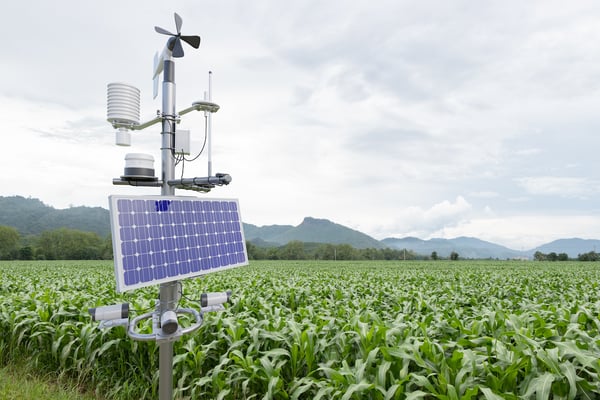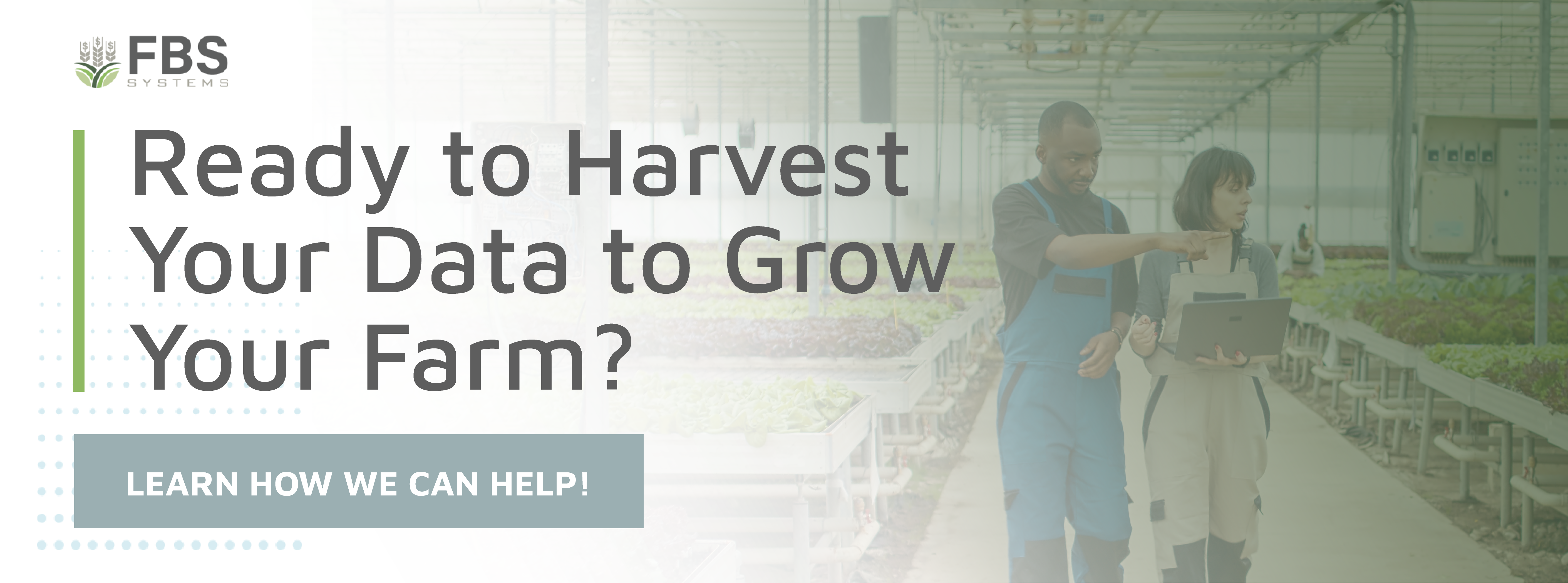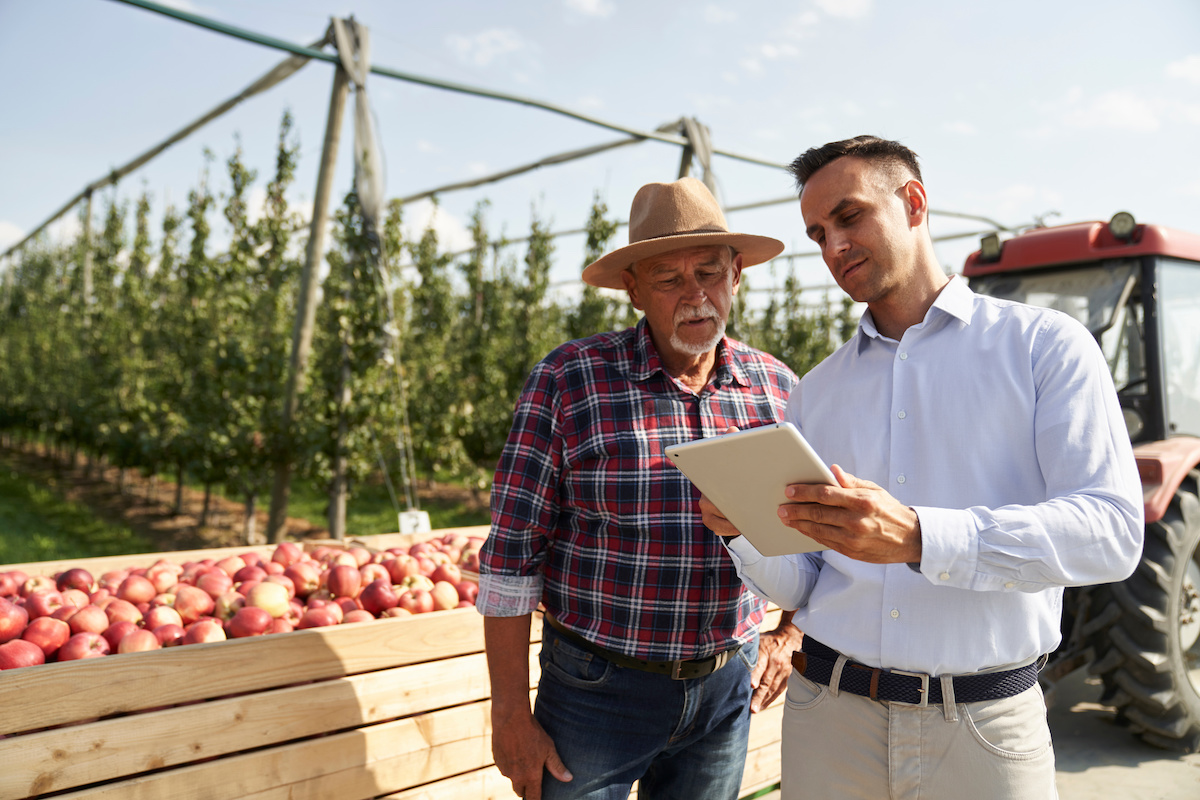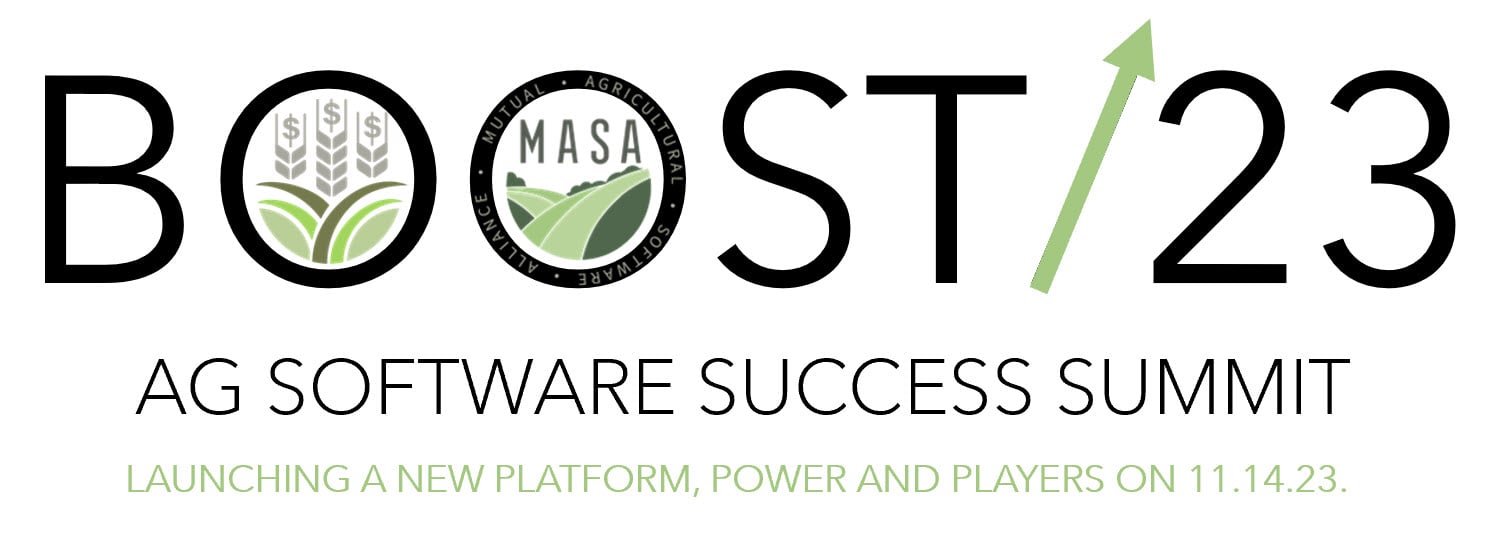New technology is being utilized across numerous industries, and it’s rapidly changing the way that we live and work. You’ve likely heard of “The Cloud,” a term commonly used throughout the technology space and made popular by big companies like Apple, Amazon, and Microsoft. But what is “The Cloud,” and what does it have to do with farm management?
The cloud, while not a physical entity, is a collection of servers used around the world to store data. This makes critical information highly accessible for farmers by creating an optimized digital ecosystem for your farm data to live. Cloud data management is creeping up all over the place and has shown a wide range of benefits for farmers in particular.
In fact, the digital farming market is expected to grow to $56 billion by 2030, and cloud computing is helping us get there.
Quick Links
- What is Cloud Computing?
- Challenges of Data Management
- Applications of Cloud Data Management
- Cloud Data Management Software from FBS
What Is Cloud Computing?
Imagine sharing organized information with your team, or other businesses, with the click of a button. Better yet, imagine seeing real-time data about all aspects of your farm operation from any of your devices. This would allow you to send profit information to your accountant or share inventory counts with your management team, all without jumping through hoops to obtain the information. Sounds simple, right? That’s the beauty of cloud computing.
Cloud computing in the agriculture industry introduces the ability to instantly gather, sort, and share information with the people or departments that need to see it. Using the internet, this ag tech software makes data accessible to anyone granted permission to see it. Additionally, this information can be accessed across screens, rather than being tied to specific on-premises computers on your farm.
Cloud technologies also allow for scalability and automation. As your business grows, so will your farm tech. Instead of purchasing more farm management tools to account for new operational expansions, cloud software can keep up with your changing demands. This reduces the need for upfront expenses for new hardware and software solutions.
Plus, with cloud software, your processes can be automated to reduce time spent gathering data and instead allow you to focus more on business related tasks. This can look like automated inventory updates, regular generation of monthly reports, or scheduled reminders for staff members, as a few examples.

Challenges of Data Management
Data is what drives business decisions and promotes growth across operations. While it is an essential part of any business, there are still some challenges that hold farms back from being optimized enterprises. From outdated tools, poor data recovery methods, and storage issues, it makes sense that cloud data management tools and ERP software are gaining popularity in agriculture.
Legacy Tech
Are you still using old technology? Outdated farm tech for data management tools pose significant challenges to your productivity. With older technology, it might take you longer than needed to search for the specific information in the format that you need. When you have reporting deadlines quickly approaching, this can quickly become an added stressor to the already fast-paced environment of farm management.
Data Recovery
Housing your business information with old hardware or outdated software tools might be detrimental in the event of lost data. According to the Harvard Business Review, the global average cost of a data breach was about $4.35 million in 2022. Whether your physical files are damaged by severe weather or digital documents are accidentally deleted, it can be difficult to replace all of that lost information.
Cloud software, however, can help reduce the likelihood of losing data. Farm software tools often offer data recovery, so the last version of a document can be pulled from the history housed within the software’s cloud. Losing data files can be extremely scary, and even costly depending on the extent of the damage, but backup information from cloud data management software can give you peace of mind.
Storage
On-premises devices, or even physical storage methods, have a clear limit. If you are rapidly gathering data and creating new documents for your business, you are likely going to run out of space sooner or later. You might become unsure about what data you have, where it is, and how to use it when additional data comes in.
Plus, when your storage is full, you need to make quick decisions regarding your management practices. This is often a moment where farmers begin to wonder about the benefits of cloud data management tools and how they can scale to fit the demands of growing businesses.
Applications of Cloud Data Management
Cloud data management tools can resolve some common problems that arise with the use of outdated tools. But what do some of these advantages look like, particularly on farms?
Financial reporting is the central component of farm operations, which is often difficult as a result of the nuances of the agriculture industry in comparison to businesses that run during a standard calendar year. Cloud data management not only streamlines data collection and analysis, but can simplify reporting processes outlined by the Farm Financial Standards Council (FFSC) as well. Let’s take a closer look at how cloud software can improve financial data management on farms.
Real-Time Data
Up-to-date data is critical for informed decision making on your farm. From employee management to inventory control, cloud-based data management can generate the metrics you need in a matter of seconds. This not only saves you time by reducing the number of touchpoints needed to compose reports, it also is quite cost effective since you won’t need to maintain complex on-premises servers when using cloud-based software.
With accurate data that is assembled quickly, farmers can gain a more holistic view of their farm operations. Plus, with AI and automation capabilities, reports will be automatically generated. Using cloud technology and advanced AI tools, sensors that are placed across a farm operation to gather data will all be compiled onto a cloud server. This provides a snapshot of farm conditions and promotes more informed decision making.

Growth Monitoring
Do you know where your farm stands today compared to a year ago? If you expand now, will you also increase profits? Your answers to these questions are vital for whether or not you are in a good position to make changes across your business that will help your operation grow.
The more information you have, the more informed you are regarding the status of your enterprise. This means farmers can make data-backed decisions concerning business endeavors, including those related to budget and overall financial performance.
Information Sharing
Thanks to cloud data management, you can interactively share real-time, customized reports and dashboards with the people you work with. This includes employees, stakeholders, vendors, lenders, and customers. Let’s say you are looking to analyze data on your crop development.
Your team can collaboratively access the same database, but thanks to views and dashboards, they will be able to see the key performance indicators that are most meaningful for their interests.
For example, production employees may concentrate on agronomic factors while controllers and lenders are most interested in cost trends or budget variances.
Shareable data not only promotes collaboration on your team, but also strengthens your reporting processes. Now farmers can quickly share their financial data with their accountants, as opposed to manually tracking down documents. Plus, the collaborative environment means that data is constantly being updated so all generated reports are highly accurate.
Cloud Data Management Software from FBS
Leveraging the internet to manage farm data can seem daunting at first. Many farmers have discussed their fears surrounding security risks when using cloud computing software. How do you stop unwanted individuals from accessing your information? How can we ensure that our customer and vendor information is kept private?
Earlier this week at the BOOST/23 Software Summit, FBS unveiled the latest updates to our software lineup, including advanced cloud capabilities as well as wrap-around services. As an experienced software provider, we’ve heard concerns from our customers regarding cloud capabilities and data security. Our software tools house data within your own virtual server, meaning that your information will be stored within a private database and can’t be accessed by anyone outside of your organization. Additionally, using cloud-based software, your data can be easily downloaded onto your on-premises devices as needed.
It’s become clear in recent years that cloud capabilities are helping us make great strides in the way we conduct our financing. FBS Systems is committed to helping our customers boost farm productivity by using advanced tools and smart connectors that are easy to implement and resolve the challenges that farmers are facing from legacy technology.
To learn more about cloud data management solutions from FBS, get in touch with our team today!
















